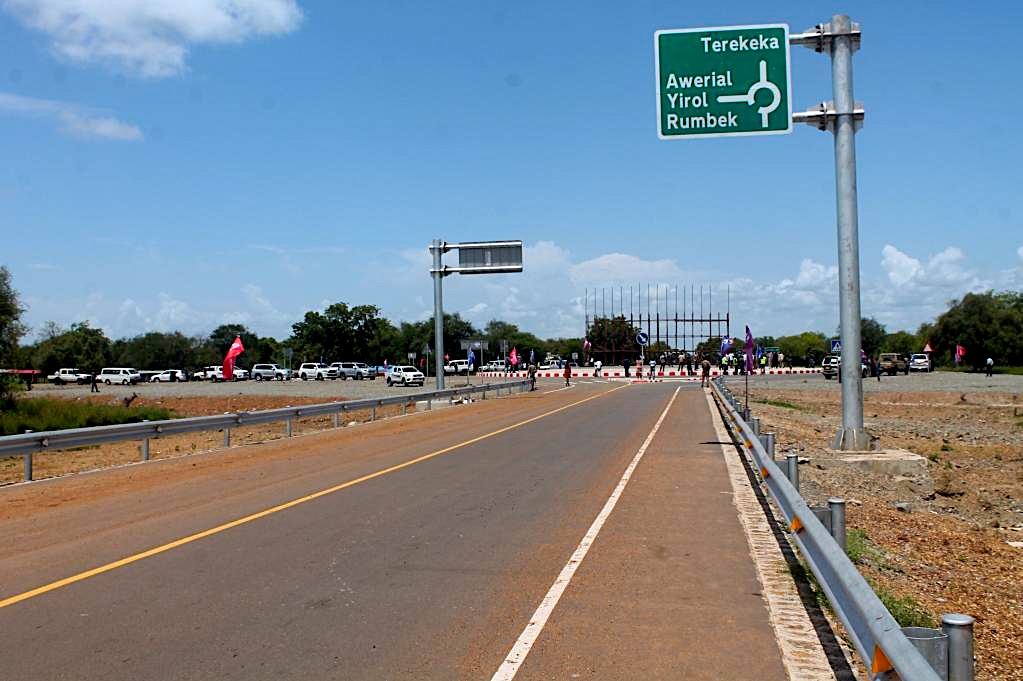Juba-Bahr el Ghazal road constructed by the Chinese company through the oil for-road agreement between Juba and Beijing. |File Photo|.
As South Sudan’s leader, Salva Kiir Mayardit, and his large entourage negotiate with Chinese partners major investment in the oil and mining sectors, some members of the Transitional National Legislative Assembly already anticipate throwing through the window the lucrative oil-for-road contract, singly put to action by the council of ministers in March 2019.
The infamous oil-for-road scheme was first discussed at the sideline meeting of the China-Africa cooperation summit in 2018 in Beijing, China and the details were concealed from the public eye.
It came into effect after President Kiir and his Chinese counterpart, Xi Jinping agreed to advance the infrastructure development in South Sudan powered by crude oil.
In the deal, Juba agreed to offer Beijing 10,000 barrels of crude oil per day to China Exim Bank, and on the other hand, Beijing constructed a network of highways linking Juba to the country’s 10 states and 3 administrative areas; on the spotlight was the Juba-Bahr el Ghazal Road and Juba-Bor road.
The deal is opaque in its nature leaving many critical questions of public interest unknown in which its provisions, terms of reference, and duration were only made available to the president and his inner circle.
Weeks later after the declaration of the lucrative oil for roads scheme, Information Minister Makuei announced an additional 20,000 barrels of crude oil per day to China Exim Bank amounting to 300,000 bpd, the letter bankrupted the country’s economy, as the prices of essential consumable goods continue to shoot through the roof, foreign reserves depleted and the local currency keeps depreciating against the US dollar.
The parliament’s standing specialized committee on finance and economic planning—angered by the government’s inability to pay the civil servants and army for nearly ten months—suggested trashing out the contract with the Chinese to save money to clear the salary arrears and pay the civil servants and army timely to save the country from total collapse.
In a sitting chaired by Speaker Jemma Nunu Kumba today (4 September), Legislator Changkuoth Bichiok Reth petitioned the parliament to suspend the resolution passed by the cabinet which allocates the Nile Blend Crude Oil (Block 1,2,4, and 5A) for infrastructure development projects and be reallocated by directing it to pay and clear the wages and salaries of the entire government and the government operation until a better solution is found to reallocate back the Nile Blend Crude Oil to the infrastructure development projects.
Changkuoth also advised the ministry of finance and planning and the country’s revenue authority to save all the non-oil revenue in the government salary account.
He said the Nile Blend Crude Oil (blocks 1,2,4 and 5A) generates $44 to 47 million US dollars monthly which could pay the salaries and pay for the government’s operational costs.
The raging war in the neighboring Sudan triggered a shutdown of South Sudan’s oil production rendering the country in economic hardship.
Yesterday (3 September), President Kiir solicited Chinese investors to fund the alternative oil pipeline through Djibouti via Ethiopia to enable the country to export its crude oil to the international market.
The country’s leader also asked the Chinese investors to construct a local oil refinery to meet the local demands and export oil products to neighboring countries as an alternative to raising funds to run the government projects.




